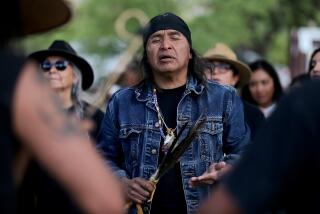Tribe Wins Appeal in Fight for Custody of Indian Girl : Courts: Ruling could set stage for battle among the Seminoles, the mother and foster parents for child.
- Share via
SANTA ANA — An Oklahoma Indian tribe won a victory when an appeals court ruled that an Orange County Superior Court commissioner overstepped his authority in a custody dispute over a Seminole Indian child.
In an opinion released Monday, the 4th District Court of Appeal overturned Commissioner Gale P. Hickman, who ruled in June that a baby girl was an “Indian child” under the definition in a federal law but that the membership criteria established by the Seminole Nation of Oklahoma were not reasonable.
The higher court’s ruling sets the stage for what could turn out to be a protracted child custody battle among the tribe, the mother and the temporary foster parents.
“The question is really, ‘Who’s going to decide who’s an Indian?’ ” said the Seminole’s attorney, J. Michael Hughes.
The question arose during a custody dispute over the now-20-month-old girl who was taken away from her allegedly unfit mother and made a dependent of the court in Feb. 22, 1991.
According to the appellate court’s eight-page unanimous decision, the baby, identified only as Alexandria Y., was taken from her mother, Renea Sue Y., and placed in the temporary custody of a Latino family.
When officials at the Orange County Social Services Agency discovered that the child’s mother was a Seminole, they contacted the tribe as required by the federal Indian Child Welfare Act.
Hughes then contacted the Juvenile Court to request that it follow the federal act’s provision that efforts be made to place the child in the custody of an Indian family.
Last June, Hickman held a hearing to determine whether Alexandria was an Indian child under the definition of the act. Although he ruled that the girl is an Indian child, he challenged the reasonableness of the tribe’s membership requirements.
According to testimony at the hearing, Seminole membership is open to anybody who can show a blood relationship to an ancestor on a list of names called the “Dawes Commission Roll.” The roll recorded the names of Seminole Indians from 1897 to 1907.
Many other tribal nations require a “blood quantum,” or a specific percentage of Indian blood, for an individual to be accepted as a member. The Seminoles, however, do not have such a requirement because to do so would, in effect, cause the tribe to become extinct, a tribal enrollment officer testified at the hearing.
Hickman ruled that the Seminoles needed to establish a blood quantum requirement in order to make the Indian Child Welfare Act applicable to the case.
The baby’s mother, the tribe and the county Social Services Agency disputed the commissioner’s decision. Attorney Harold LaFlamme, who represents Alexandria, favored Hickman’s ruling and opposed the appeal. LaFlamme could not be reached for comment Monday.
Alan J. Crivaro, the appellate attorney for the child’s mother, said he was pleased with the appellate opinion. He said he plans to fight the attempts to remove his client’s parental rights.
None of the attorneys reached Monday would discuss details of why Alexandria was taken away from her mother.
Hughes said the next step for the Seminoles is to petition the Juvenile Court to have the case transferred to a tribal court. He said the tribe also plans to request that the child be placed in the temporary custody of Indian parents.
The matter may further be complicated, attorneys said, because the Latino family currently caring for Alexandria may fight to adopt the child.
“I expect this case to heat up,” said John H. Abbott, the attorney for the county’s Social Services Agency. “A lot of lines are being drawn.”
More to Read
Sign up for Essential California
The most important California stories and recommendations in your inbox every morning.
You may occasionally receive promotional content from the Los Angeles Times.













